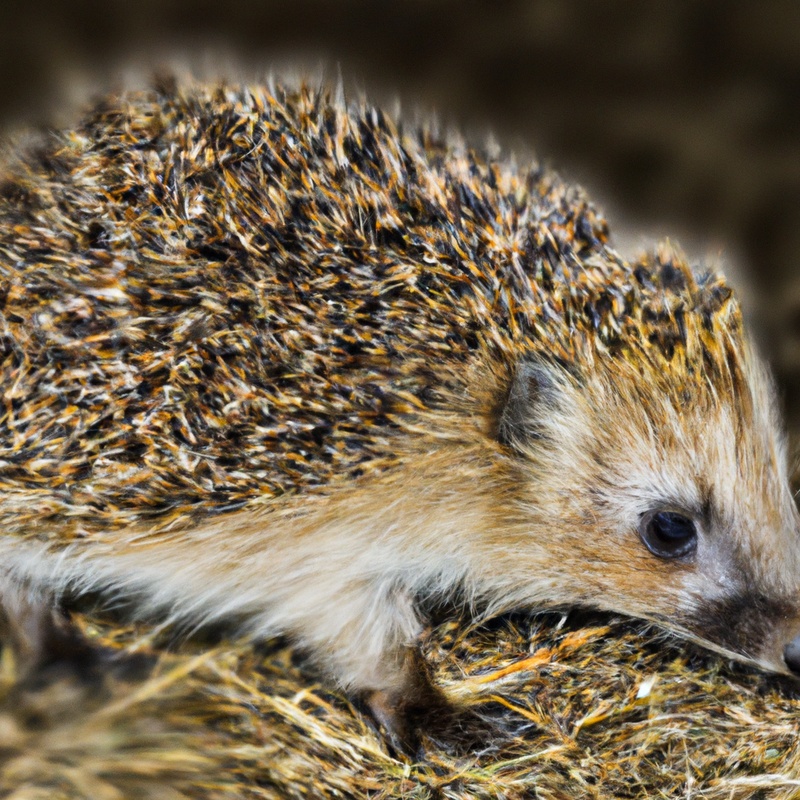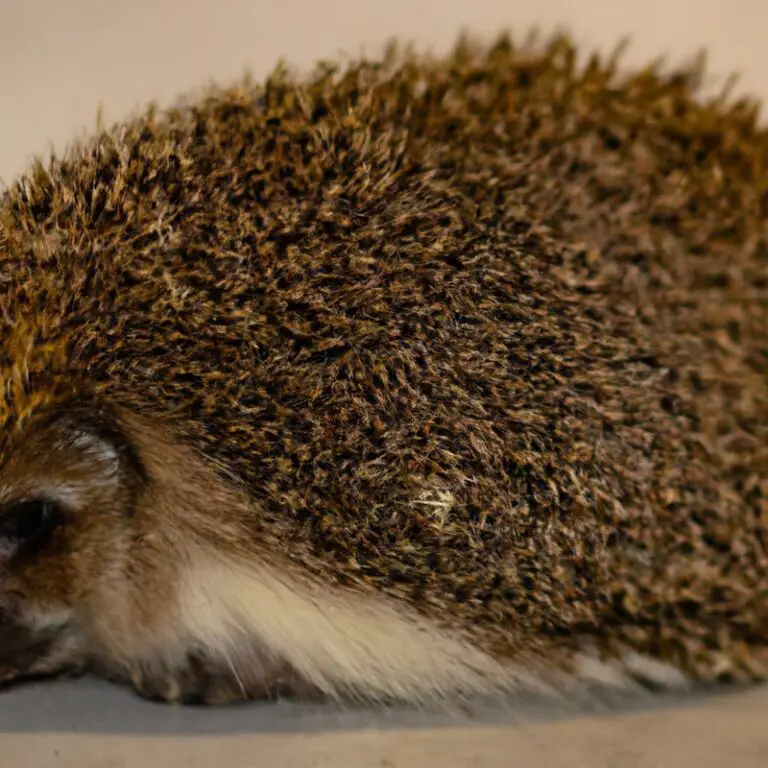How Long Do Hedgehogs Live In Captivity?
Key Takeaways:
- Hedgehogs can live up to 4-7 years in captivity.
- A healthy diet and proper care can increase their lifespan.
- Stress and lack of exercise can shorten the lifespan of captive hedgehogs.
- Regular veterinary check-ups are essential for maintaining their health.
Are you considering getting a hedgehog as a pet?
Or maybe you already have one and you’re curious about their lifespan?
Well, you’ve come to the right place! In this article, we’ll delve into the fascinating world of hedgehog longevity in captivity.
You’ll discover the various factors that affect their lifespan, the average lifespan of different hedgehog species, and even some jaw-dropping cases of hedgehogs that have lived well beyond expectations! Plus, we’ll also explore common health issues that can affect their lifespan and provide you with valuable tips on how to increase their longevity.
So, let’s dive in and unravel the secrets of these adorable and spiky creatures!
| Average Lifespan in Captivity (years) | |
| Minimum | 2 |
| Maximum | 10 |
| Average | 4-6 |
Factors Affecting Hedgehog Lifespan
Factors such as genetics, diet, exercise, veterinary care, and environmental conditions can greatly impact the lifespan of a hedgehog in captivity.
Genetic factors
Genetic factors play a significant role in determining the lifespan of hedgehogs in captivity.
Certain genetic traits can impact their overall health and longevity.
For example, hedgehogs with a strong genetic predisposition to certain diseases may have shorter lifespans.
Additionally, certain genetic variations may affect their ability to handle stress or adapt to changes in their environment, which can impact their overall health and lifespan.
It is important to consider genetic factors when caring for hedgehogs to ensure their well-being and longevity.
Diet and nutrition
Diet and nutrition are key factors in the lifespan of hedgehogs in captivity.
A balanced diet is essential to their overall health and longevity.
Hedgehogs in captivity should be provided with a variety of foods to meet their nutritional needs.
A high-quality, commercial hedgehog food can serve as a base, supplemented with insects, fruits, and vegetables.
It’s important to avoid feeding them foods that are high in fat and sugar.
Providing fresh water at all times is also crucial for their well-being.

Exercise and physical activity
Exercise and physical activity are important for the overall health and well-being of hedgehogs in captivity. Regular exercise helps to keep hedgehogs physically fit, maintain a healthy weight, and prevent obesity-related health issues.
It also helps to stimulate their natural behaviors and prevent boredom.
Providing a spacious enclosure with plenty of room for movement, along with objects like exercise wheels and tunnels, can encourage the hedgehog to engage in physical activity. Daily supervised free-roaming time outside of the enclosure can allow hedgehogs to explore, forage, and exercise.

Access to veterinary care
Access to veterinary care is essential for the well-being and longevity of hedgehogs in captivity.
Regular check-ups and prompt medical attention can help detect and treat any health issues early on.
A qualified veterinarian can provide guidance on proper nutrition, habitat setup, and general care.
Regular vaccinations and parasite prevention are also important to ensure a healthy hedgehog.
It’s important to establish a relationship with a knowledgeable veterinarian to provide the best care for your hedgehog throughout its life.
Environmental conditions
The environmental conditions play a significant role in the lifespan of captive hedgehogs.
Here are some important factors to consider:
- Temperature: Hedgehogs are sensitive to extreme temperatures. Maintain a comfortable temperature range of around 70-80°F (21-27°C in their habitat.
- Humidity: Excessive humidity can lead to respiratory problems. Keep the humidity level between 30-50%.
- Lighting: Provide a consistent light-dark cycle of about 10-12 hours of light per day. This helps regulate their natural behavior and prevents stress.
- Ventilation: Good airflow is crucial to prevent the accumulation of harmful odors and gases. Ensure adequate ventilation in their enclosure.
- Noise level: Hedgehogs have sensitive hearing. Keep their environment quiet and avoid loud noises that can cause stress.
Remember, a well-maintained and suitable environment can greatly contribute to the health and longevity of your hedgehog.
Average Lifespan of Hedgehogs in Captivity
Hedgehogs in captivity usually live for an average of 4 to 6 years.
Comparison of lifespan in different hedgehog species
Different hedgehog species have varying lifespans in captivity.
African pygmy hedgehogs, the most common pet hedgehog species, typically live between 4 to 6 years.
However, some can live up to 9 years with proper care.
European hedgehogs, on the other hand, have an average lifespan of around 10 years in captivity.
Other rarer species, such as the long-eared hedgehog and the four-toed hedgehog, have similar lifespans to African pygmy hedgehogs.
It’s essential to provide a suitable environment, nutrition, and veterinary care to ensure hedgehogs live a healthy and fulfilling life in captivity.
Research findings on average lifespan
Research findings show that hedgehogs in captivity have an average lifespan of 4 to 6 years. However, with proper care and a healthy environment, some hedgehogs have been known to live up to 10 years or more.
Factors that can affect their lifespan include genetics, diet, hygiene, and exercise.
Regular veterinary check-ups and providing a balanced diet rich in protein and nutrients are important for their overall well-being. It’s also essential to keep their living space clean and provide opportunities for exercise and mental stimulation.
Longevity Records of Hedgehogs
Some hedgehogs have lived beyond the average lifespan in captivity – here are a few notable cases.
Notable cases of hedgehogs living beyond the average lifespan
There have been a few notable cases of hedgehogs living beyond the average lifespan.
One famous example is a hedgehog named Bumblebee, who lived to be 10 years old.
Another hedgehog, named Christina, lived to be 14 years old, which is extremely rare for her species.
These cases show that hedgehogs can live longer than expected with proper care, diet, and a stress-free environment.
It’s important to provide your hedgehog with the best possible care to ensure a long and healthy life.
Factors that may have contributed to their longevity
Factors that may have contributed to the longevity of hedgehogs in captivity include:
- Proper nutrition: A balanced and appropriate diet can play a significant role in hedgehog longevity. Providing them with a diet rich in protein, fiber, and essential nutrients can support their overall health and potentially increase their lifespan.
- Safe and adequate living environment: Hedgehogs need a comfortable and secure habitat that meets their physical and psychological needs. The right temperature, proper bedding, and enough space for exercise contribute to their well-being and potentially extend their lifespan.
- Regular veterinary care: Regular check-ups, vaccinations, and preventive treatments help hedgehogs maintain good health and detect any potential health issues early. Access to veterinary care is crucial for their longevity.
- Stress reduction: Creating a calm and stress-free environment can have a positive impact on hedgehog longevity. Minimizing loud noises, excessive handling, and abrupt changes can help promote a sense of well-being and overall health.
- Social interaction: While hedgehogs are solitary animals, providing appropriate socialization opportunities with their owners can contribute to their overall happiness and well-being, potentially extending their lifespan.
- Exercise and mental stimulation: Regular physical exercise and mental enrichment are vital for hedgehog health. Providing them with opportunities to explore, play, and engage in activities can help prevent boredom and potential health issues, potentially increasing their lifespan.
It’s important to remember that these factors can enhance hedgehog longevity, but individual hedgehogs may have varying lifespans due to genetic factors and other variables.
Common Health Issues Affecting Hedgehog Lifespan
Obesity, dental problems, skin disorders, tumors and cancers, as well as respiratory and heart conditions, can significantly impact the lifespan of hedgehogs in captivity.
Obesity and related complications
Obesity is a common health issue that can affect the lifespan of hedgehogs. It can lead to various complications, such as joint problems, heart disease, and difficulty in breathing.
The excess weight puts strain on their bodies, making it harder for them to move, exercise, and stay active.
Obesity can also increase the risk of developing other conditions, like fatty liver disease and diabetes. To prevent obesity and its related complications, it is important to provide a balanced diet, avoid overfeeding, and ensure regular exercise for your hedgehog.
Dental problems
Dental problems can significantly impact the lifespan of hedgehogs in captivity.
- Tooth overgrowth: Hedgehogs’ teeth continuously grow, and if not worn down properly, they can become overgrown, leading to difficulty eating and serious health issues.
- Tooth fractures: Chewing on hard objects can cause tooth fractures in hedgehogs. These fractures can be painful and may require veterinary intervention.
- Gum disease: Poor oral hygiene can result in gum disease, which can cause pain, infections, and tooth loss for hedgehogs.
To prevent dental problems, provide your hedgehog with appropriate chew toys, maintain good oral hygiene, and seek veterinary care if you notice any signs of dental issues.
Skin disorders
Skin disorders can be common health issues affecting the lifespan of hedgehogs in captivity. Some of these disorders include mites, fungal infections, and dry skin.
Mites can cause itching, hair loss, and skin irritation.
Fungal infections may lead to scaly patches or lesions on the skin. Dry skin can result in flakiness and discomfort for the hedgehog.
Regular veterinary check-ups, proper hygiene, and a balanced diet can help prevent and manage skin disorders in hedgehogs.
Tumors and cancers
Tumors and cancers are common health issues that can affect the lifespan of hedgehogs in captivity.
These conditions occur when abnormal cells grow uncontrollably, forming masses or tumors in different parts of the body.
Tumors can be benign or malignant, with malignant tumors being cancerous and capable of spreading to other tissues.
These conditions can cause various symptoms such as lumps, weight loss, changes in appetite, and difficulty breathing.
If you notice any abnormal signs in your hedgehog, it’s important to consult a veterinarian promptly for proper diagnosis and treatment options.
Respiratory and heart conditions
Respiratory and heart conditions can significantly impact the lifespan of a hedgehog in captivity. These conditions can cause difficulty breathing, lethargy, and reduced activity levels.
Some common respiratory conditions include pneumonia and bronchitis, while heart conditions may include congestive heart failure.
Providing a clean and stress-free environment, ensuring proper ventilation, and monitoring for any signs of respiratory or heart issues are important in maintaining the health and well-being of captive hedgehogs. Regular vet check-ups are also crucial for early detection and treatment of any potential conditions.
Tips for Increasing the Lifespan of a Pet Hedgehog
To increase the lifespan of your pet hedgehog, focus on providing a balanced diet, regular exercise, a clean living environment, regular veterinary care, and minimizing stress.
Providing a balanced and appropriate diet
To provide a balanced and appropriate diet for your pet hedgehog, you should focus on high-quality commercial hedgehog food as the main component.
Supplement their diet with small amounts of fresh vegetables, fruits, and insects.
Avoid feeding them sugary or fatty foods, as these can lead to health issues.
It’s important to offer fresh water at all times and monitor their food intake to avoid overfeeding.
Consulting with a veterinarian who is knowledgeable about hedgehog care can also help ensure you’re providing the best diet for your pet.
Ensuring regular exercise and mental stimulation
Regular exercise and mental stimulation are essential for the overall wellbeing of your pet hedgehog. To ensure they get enough exercise, provide them with a large, secure enclosure to explore.
Add tunnels, toys, and obstacles to keep them active and engaged.
Consider supervised playtime outside of their enclosure to allow for additional exercise. Hedgehogs are intelligent creatures, so provide them with mental stimulation through puzzle toys, foraging activities, and hiding treats.
Monitor their activity levels and adjust as necessary to ensure they stay healthy and happy.
Maintaining a clean and comfortable living environment
To maintain a clean and comfortable living environment for your pet hedgehog, there are a few key things you can do:
- Provide a spacious cage with appropriate bedding materials to ensure comfort and prevent any irritations or injuries.
- Regularly clean the cage by removing soiled bedding, food debris, and droppings. This helps prevent odors and keeps the environment hygienic.
- Keep the temperature in the cage at a comfortable level, between 70-80 degrees Fahrenheit, to ensure your hedgehog stays cozy and doesn’t overheat or get too cold.
- Provide fresh water daily and clean the water dish regularly to prevent bacterial growth.
- Place the cage in a quiet and calm area of your home, away from loud noises and excessive activity, which can stress your hedgehog.
Regularly monitoring health and seeking veterinary care
Regularly monitoring your hedgehog’s health and seeking veterinary care are essential for maintaining their well-being.
Keep an eye out for any changes in behavior, appetite, or physical appearance.
Regularly check their eyes, ears, nose, and skin for any signs of infection or injury.
Additionally, ensure they receive regular check-ups from a specialized veterinarian who can spot any potential health issues early on.
Taking proactive measures in monitoring their health and seeking timely veterinary care will greatly contribute to your pet hedgehog’s overall lifespan and happiness.
Minimizing stress and handling with care
Minimizing stress and handling your pet hedgehog with care are essential for ensuring their well-being and longevity. To achieve this, create a calm and quiet environment for your hedgehog, as loud noises and sudden disturbances can stress them out.
Additionally, handle your hedgehog gently and avoid any rough movements.
Regularly clean their enclosure and provide them with a well-balanced diet to keep them healthy. Remember to observe their behavior and seek veterinary care if you notice any signs of illness or distress.
Commonly Asked Questions about Hedgehog Lifespan in Captivity
Here are some commonly asked questions about hedgehog lifespan in captivity.
What is the average lifespan of a hedgehog in captivity?
On average, hedgehogs can live up to 4-7 years in captivity.
However, with proper care and a healthy diet, some hedgehogs have been known to live up to 10 years or even longer.
Providing a suitable habitat, balanced diet, regular veterinary check-ups, and plenty of mental and physical stimulation can help ensure a longer lifespan for your hedgehog.
It’s important to remember that individual hedgehogs may have different lifespans depending on their genetics, overall health, and care received.
Can hedgehogs live longer with proper care?
Yes, hedgehogs can live longer with proper care.
Here are a few key aspects to consider:
- Providing a well-balanced diet: A nutritious diet is crucial for a hedgehog’s health and longevity. Feed them a combination of high-quality hedgehog food, insects, and occasional fruits or vegetables.
- Maintaining a proper habitat: Create a comfortable living space for your hedgehog with a suitable cage, bedding, hiding spots, and temperature regulation.
- Regular veterinary check-ups: Schedule routine vet visits to ensure your hedgehog’s health is monitored and any potential issues are addressed early on.
- Socialization and mental stimulation: Spend time with your hedgehog, offer them toys and activities to keep them mentally and physically stimulated.
- Environmental enrichment: Provide your hedgehog with opportunities for exploration and exercise, such as a safe play area or a hedgehog wheel.
- Stress reduction: Minimize stressors in your hedgehog’s environment and handle them gently to avoid unnecessary stress.
By attending to these factors and providing proper care, you can help increase the lifespan of your hedgehog and ensure they live a happy and healthy life.
What should I feed my hedgehog to ensure a long life?
To ensure a long life for your hedgehog, you should provide them with a balanced and nutritious diet. Here are a few key guidelines:
- Feed them a high-quality commercial hedgehog food as a staple. Look for brands that contain a mix of protein, fat, and fiber.
- Supplement their diet with fresh fruits, vegetables, and insects. These additions provide essential vitamins and minerals.
- Offer occasional treats like mealworms, crickets, or cooked meats, but in moderation.
- Avoid feeding them foods that are toxic or harmful, such as chocolate, caffeine, onions, or garlic.
- Ensure they have a constant supply of fresh, clean water.
Are there any supplements that can enhance hedgehog longevity?
Supplements can indeed help enhance hedgehog longevity. However, it’s important to note that a balanced and nutritious diet is the foundation for their well-being.
Some recommended supplements for hedgehogs include calcium, omega-3 fatty acids, and vitamin E.
These supplements can support their overall health and immune system. However, always consult with a veterinarian for proper dosage and administration to ensure the well-being of your hedgehog.
How can I identify signs of illness or age-related decline in my hedgehog?
To identify signs of illness or age-related decline in your hedgehog, you should pay attention to changes in their behavior, appetite, and physical appearance.
Look out for a decrease in activity level, weight loss, loss of appetite, or abnormal droppings.
Any unusual discharge from the eyes, ears, or nose, as well as changes in the texture or appearance of their fur, should also be observed.
If you notice any of these signs, it’s best to consult a veterinarian who specializes in exotic pets for a proper diagnosis and treatment.
Final Verdict
The lifespan of a hedgehog in captivity is influenced by various factors, including genetics, diet, exercise, access to veterinary care, and environmental conditions. While the average lifespan varies among different species, research suggests that hedgehogs generally live for 4 to 7 years in captivity.
However, there have been cases of hedgehogs living beyond the average lifespan.
To increase the lifespan of a pet hedgehog, it is essential to provide a balanced diet, regular exercise, a clean living environment, and regular veterinary care. By following these tips and minimizing stress, you can help ensure a long and healthy life for your hedgehog companion.







